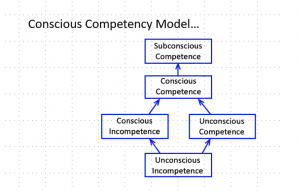I have found The Conscious Competence Learning Model to be extremely helpful in this regard. Also known as the Four Stages of Competence, it is a widely recognized learning theory that describes the psychological states individuals go through when acquiring a new skill. Developed by Noel Burch in the 1970s, this model emphasizes the importance of awareness, practice, and conscious effort in achieving personal and professional growth.
The Conscious Competence Model

Consider: With a new skill you aren’t familiar with, you haven’t given it much thought and are likely not competent in practicing it. Let’s say you haven’t been around horses much and don’t know how to ride one. That’s the bottom of the chart: unconscious incompetence.
If you are then exposed to horses some, you are moved into conscious incompetence: you become suddenly aware of how much you don’t know about how to ride horses or even how to approach them. You try it and quickly realize you aren’t good at this. Without this level of exposure, you likely wouldn’t even feel the need to improve your riding skills.
Alternatively. some people who have grown up riding horses may be quite competent in riding them. It feels instinctive to them. They wouldn’t be able to tell you all the steps necessary to doing it correctly; they can just do it. That’s unconscious competence.
Next, when you have broken down all of the steps and skills needed to do something well—and can do it well—we have reached conscious competence. You can ride a horse well and you can explain to someone else how to do it. Yet this level requires having to think about everything all the time, which takes a lot of energy!
What I am suggesting here is getting to the very top level where we practice competent skills almost automatically: subconscious competence. This comes with practice over time, and results in doing the right thing without having to think about it. It’s just built into who we are. And if someone stopped us and asked about, it might take a second, but we’d be able to explain why we are doing what we are doing.
This Conscious Competency Model can be applied to almost any coaching skill. Glance through your list of coaching skills and target one you’d like to work on. Then use the action-reflection cycle.
The Action-Reflection Cycle
Here’s the cycle:
- focusing on just one skill a time
- practicing that one skill over and over
- reflecting on that one skill while practicing it to keep improving
- once it becomes habitual, then moving on to the next skill
As my friend and colleague Neil Cole says, “First things first, one thing at a time, always one more thing.”
Improve your coaching skills until they are habitual and you use them—subconsciously and without effort—in various daily situations. When you practice a skill correctly until you’re doing it naturally, it has become a habit.
More Ways to Focus
If you need help identifying the skills you need to concentrate on growing there is no better resource than The 360° Christian Coach Assessment. This online tool is the only assessment for Christian coaches that is backed by thorough qualitative research. It clearly and accurately identifies your coaching strengths and areas for improvement.
